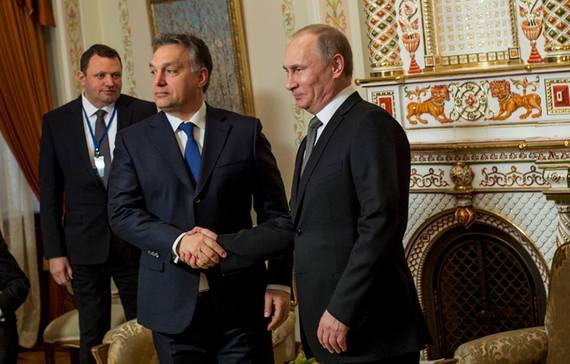It sounds like a headline from the European version of The Onion, but Viktor Orbán, months from winning a landslide reelection in April, announced over the weekend his intentions to turn Hungary into an 'illiberal state,' modeled after China or Russia, arguing that the 2008 financial crisis demonstrated that liberal democratic states aren't competitive.
It's hard to know just how seriously to take Orbán's latest comments.
If his first government, over a decade ago, was traditionally liberal conservative, Orbán's most recent term was marked by more nationalist, illiberal and authoritarian tendencies. It's not hard to believe that, with a two-thirds majority behind him, Orbán could turn fully away from liberal democracy and toward illiberal authoritarianism in his third term, because Orbán (pictured above with Russian president Vladimir Putin) has been enacting illiberal policies for the past four years.
Other Hungarian commentators argue that Orbán's emphasis was on the liberal market system and its failures during the global financial crisis. In that sense, Orbán may have been calling merely for a shift from a European social welfare state to a more state capitalist model. Though Orbán came to power as a liberal market proponent, his 2010-14 government engaged in healthy spending on public works programs, nationalized Hungary's private pensions system and introduced the highest VAT rate in the European Union (27 percent) in a bid to end Hungary's €20 billion post-crisis loan program with the International Monetary Fund. Nonetheless, even significant moves in that direction could spook global markets, send the Hungarian forint plummeting or dampen growth and investment.
Orbán's weekend speech came as he, like Russian president Vladimir Putin, has called for restrictions on international NGOs throughout the country. Though Hungarians revolted in 1956 against Soviet rule and in favor of freedom and democracy in one of the most dramatic Iron Curtain revolutions of the Cold War, Hungarian relations with Russia today are arguably better than Hungary's relations with leading EU member-states. Orbán, who burst onto Hungary's political scene a quarter-century ago as an anti-communist activist, signed a $14 billion lending deal with Russia in January in pursuit of greater nuclear energy.
If Orbán goes through with plans to eliminate liberal democracy in Hungary, which has been a member of the European Union for a decade, it would cause an immediate crisis for the incoming European Commission president Jean-Claude Juncker.
In the April parliamentary elections, Orbán's feckless political rivals failed to stop him from winning another two-thirds majority that Orbán and his party, Fidesz, used between 2010 and 2014 to amend Hungary's constitution and to push through new election laws. Fidesz now holds 133 of 199 seats in the Hungarian parliament.
Though the elections were conducted under new laws designed to maximize Orbán's support, and though the state media and other arms of the Hungarian government are essentially under Orbán's political control, even a united anti-Orbán coalition that included the center-left Hungarian Socialist Party (MSzP) and four smaller, like-minded parties commanded little popular support.
In his previous term, Orbán often clashed with leaders in the European Union, including European Commission president José Manuel Barroso and European justice commissioner Viviane Reding. Orbán's government pushed through constitutional changes that undermined democracy, weakened Hungary's judiciary and constitution court, and imposed other limitations to individual and press freedom.
In his first term as Hungarian prime minister, between 1998 and 2002, Orbán governed in coalition and pursued a relatively aggressive center-right agenda. Though Orbán then showed signs of the creeping authoritarianism that he now seems to embrace, including an attempt to limit meetings of the Hungarian parliament to just once every three weeks, he governed as a conventional, if firm, conservative.
In the May 25 European parliamentary elections, the Hungarian Socialists won even fewer votes than Jobbik, the far-right, nationalist, openly anti-Semitic, anti-Roma party, which won nearly 21 percent of the vote in the April national elections as well. Despite Fidesz's appeal to older Hungarian voters, Jobbik and its telegenic leader Gábor Vona have made their greatest gains among Hungary's youngest voters, a worrying trend. Though Fidesz has distanced itself (for now) from Jobbik's most distasteful racial and ethnic rhetoric, it has often tried to blur the line between itself and Jobbik, which itself hardly embodies the spirit of a loyal opposition.
There's no precedent for EU leaders to suspend member-states, but there is a mechanism that will give Juncker and other EU leaders, including German chancellor Angela Merkel and others, leverage against Orbán beyond EU subsidies -- the suspension clause.
Added as part of the 1997 Treaty of Amsterdam, Article 7, as amended by subsequent treaties, allows the European Union to suspend a member's rights, including its vote on the European Council, if it seriously and persistently breaks key EU principles -- essentially, liberalism and democracy, as well as respect for human rights and the rule of law. Article 7 suspension requires a four-fifths majority of the members of the European Council (i.e., the leaders of the 28 member-states) and the assent of the European Parliament.
For now, it's still unlikely that Orbán is willing to take the extreme steps that would bring Hungary so clearly into Article 7 territory. But it's clear Orbán may not yet be satisfied with the constitutional changes he introduced earlier this decade and that he has more audacious plans for transforming Hungary in a direction that should be worrisome for both Hungarians and their European neighbors.
Kevin A. Lees is an attorney in Washington, DC and the editor of Suffragio.org.
